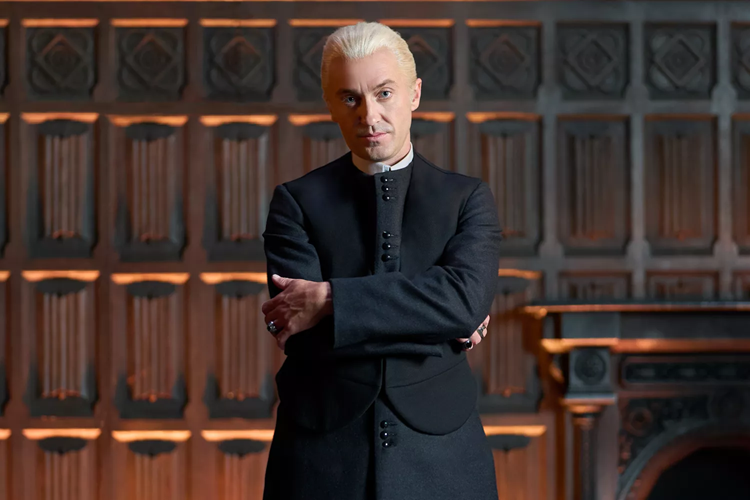‘Cursed Child’: Tom Felton’s In, But I’m Still Out
Felton reprises his role as Draco Malfoy in 'Harry Potter and the Cursed Child'. (Photo: Manuel Harlan)
by Chris Peterson
Let’s just get this out of the way. I love Tom Felton. Always have. From the minute he sneered his way onto the screen as Draco Malfoy, he added depth, humor, and yes, even a little heartbreak to a character that could’ve easily been a one-note schoolyard bully. His performance across eight films helped define a generation of storytelling, and his return to the world of Harry Potter, now as a grown-up Draco in Harry Potter and the Cursed Child, should be something worth celebrating.
And yet, I’m not celebrating. I won’t be seeing the show. And that’s not something I say lightly.
When Felton announced he’d be joining the Broadway cast of Cursed Child this coming November, fans lit up with excitement. Rightfully so. It’s the first time a major film actor from the original series is stepping onto the stage as their character. For some, this feels like the franchise coming full circle. It feels nostalgic, affirming, magical.
But for others, including me, it feels more complicated. Because any conversation about Harry Potter today can’t be separated from the shadow cast by J.K. Rowling and her ongoing attacks on transgender rights.
Let’s be clear on what’s happened. Since 2020, Rowling has made a series of statements about sex and gender that are not only disappointing, they’re actively harmful. She has aligned herself with anti-trans activists, opposed inclusive language for trans people, and most recently, celebrated a UK Supreme Court ruling that defined “woman” as biologically female. That ruling has real-world consequences. It weakens legal protections for trans women. And Rowling’s reaction? She quoted The A-Team and tweeted, “I love it when a plan comes together.”
This isn’t one tweet taken out of context. It’s a sustained campaign. She has doubled down again and again. She has created a legal fund to back court cases centered on what she calls “sex-based rights.” That language might sound neutral, but in practice, it’s being used to roll back hard-fought progress for trans people.
And here’s where it ties back to Cursed Child. While Rowling didn’t write the play’s script—Jack Thorne did, based on a story she helped create—she still profits from it. Every ticket sold, every program, every souvenir wand at the merch stand, puts money in her pocket. She remains the creator of the source material. The franchise matriarch. The name that still sits at the top of the brand.
I’ve heard the arguments from the other side. I really have.
Yes, Cursed Child is a triumph of stagecraft. It’s dazzling. It’s moving. It’s packed with some of the most jaw-dropping theatrical effects you’ll ever see. And yes, the cast and crew are full of talented, hardworking artists. Many of them likely don’t share Rowling’s views at all. Some are part of the LGBTQ+ community themselves. People argue that seeing the show is about supporting them, not her.
I also understand the idea of separating art from the artist. People say the world of Harry Potter belongs to the fans now, that it’s bigger than Rowling. That it’s okay to still love the stories, even if you don’t love the person who created them.
Our writer Greg Ehrhardt said as much in a recent OnStage Blog newsletter taking about the new TV series, “I feel like supporting the message of Harry Potter, which I believe is antithetical to her POV, but believe me, I don’t love the idea of helping her lifestyle even further.”
But for me, this isn’t about separating art from artist. This is about accountability. This is about deciding where I put my money and what that says about what I believe.
I believe trans rights are human rights. I believe transgender people deserve to live in safety, with dignity, and without having to justify their existence to the world. And I believe that when someone with Rowling’s platform uses it again and again to push exclusionary rhetoric, we need to respond with more than just sadness. We need to respond with action.
Tom Felton is a gifted actor and, from what I’ve been told, a wonderful person. I hope his Broadway run is fulfilling for him. I hope the audience that attends gives him the ovation he deserves. But I can’t justify giving money to a production that ultimately benefits Rowling. I can’t pretend this is a neutral choice. I can’t support this, no matter how good the lighting cues are.
If you still want to engage with the Harry Potter universe, there are other ways. Fan fiction. Fan art. Online communities that center trans voices. Organizations that take what Rowling built and reimagine it through a lens of love and inclusivity. The magic hasn’t disappeared. It’s just moved elsewhere.
So no, I won’t be in the Lyric Theatre this fall. I won’t be applauding Draco Malfoy’s return. And yes, that breaks my heart a little. Twenty-year-old me would have killed for this moment. But today, I know better. And I care more.
Some will say I’m overreacting. That’s fine. Everyone has to draw their own line. This is where I’m drawing mine.
Because magic doesn’t come from a script or a special effect or even a beloved character. Magic comes from who we choose to stand beside. And I stand with trans people. Always.
